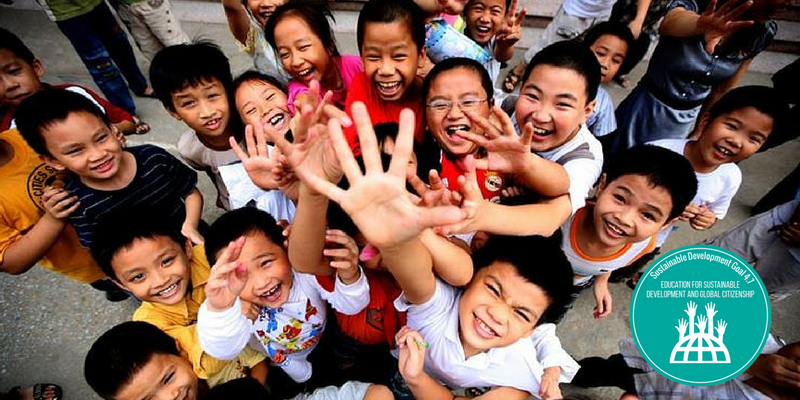
Peaceful, sustainable societies. Human rights recognized and upheld. And healthy, happy learners empowered by the skills, values and attitudes they need to become informed and active citizens.
Target 7 of Sustainable Development Goal 4 is sweeping in its scope and ambitious in its aims, asking us to assess at every step whether our actions are contributing to a better world. UNESCO Bangkok’s initiatives to support Asia-Pacific Member States’ efforts to achieve this target reflect its broad scope, spanning areas from policy planning to teacher development and more.
Here we spotlight some of the office’s current initiatives to advance SDG4.7:
Preparing teachers for global citizenship education (GCED)
Without dedicated, trained, well-resourced teachers, the promise of SDG4.7 will go unrealized. This project focuses on teacher educators, teachers and school leaders, aiming to enhance their knowledge of GCED and their ability to deliver related contents as well as to strengthen the capacity of school leaders in implementing GCED. The project is active in countries from three sub-regions: South Asia (Bhutan, India and Sri Lanka), South-East Asia (Malaysia, Philippines and Thailand) and East Asia (China, Japan and the Republic of Korea). More
Sustainability begins with teachers focuses on priority action area 3 of the Global Action Programme on Education for Sustainable Development (GAP). This project aims to support teacher education institutions and universities in Central Asia and South East Asia in enhancing their capacities to integrate ESD in teacher education using action research processes. Participating institutions are from Kazakhstan, Kyrgyzstan, Tajikistan, Uzbekistan, Cambodia, Indonesia, Lao PDR, Philippines, Thailand and Viet Nam. More
Happy Schools Project
Learners’ happiness and holistic well-being is the focus of this project initiated in 2014. The “Happy Schools” framework at the centre of this project proposes 22 criteria to determine what constitutes a “happy school”, divided into the categories of people, process and place. A recent report, “Happy Schools!: A Framework for Learner Well-being in the Asia-Pacific”, delved into the criteria in the context of this region, with a focus on the relationship between happiness and the quality of education as well as innovative approaches that put the well-being of learners first. Phase 2 of the project will be launched in 2018 and will support school leaders and teachers. More
Community-based education for sustainable development
The realization of SDG4.7 requires the involvement of stakeholders at all levels, including the community. UNESCO Bangkok is promoting community-based education for sustainable development through a project that aims to support the efforts of community and non-formal educators to embed this type of learning. The ultimate goal is to bring the community together to reflect on and address their issues and concerns from the perspective of sustainability. UNESCO Bangkok has developed a learning programme for community and non-formal educators toward this end and will pilot it in at least three countries.
Fostering Digital Citizenship through Safe and Responsible Use of ICT
ICT can promote inclusion and global citizenship – however it can also be used to the opposite effect, making the role of education to help young people navigate these challenges crucial. This initiative aims to promote policy dialogue on the ethical, safe and responsible use of ICT, and build capacity of Member States’ education sectors to foster digital citizenship among children. UNESCO Bangkok published a review of the policy responses and initiatives of 22 countries in 2016. Following this, UNESCO developed a suggested set of “digital citizenship competencies” covering literacy, safety and resilience, participation, EI, creativity and innovation. More
Education for health and well-being
Education is directly linked to health and well-being, one of the key components of SDG4.7. UNESCO Bangkok actively promotes improving access to good quality comprehensive sexuality education (CSE), as well as efforts to make schools safe and inclusive, including support Member States’ efforts to implement laws and policies that protect the rights of all learners. To this end, UNESCO, UNFPA and UNICEF and UNESCO carried out a review of comprehensive sexuality education was carried out in Bhutan, China, India and Thailand.
Additionally, UNESCO Bangkok works with UNGEI to address school-related gender-based violence (SRGBV) on the basis of sexual orientation and gender identity and expression (SOGIE). A curriculum toolkit for teachers to address SRGBV has been developed through the UNGEI regional partnership. More
Current tools to assess transversal competencies
Transversal competencies refer to the knowledge, skills, values and attitudes that are integral to thriving amid 21stCentury challenges. Integrating these into education policy and practice is a major focus of UNESCO Bangkok’s efforts to promote SDG4.7. Since 2013, the Asia-Pacific Education Research Institutes Network (ERI-NET) has conducted a series of regional studies on non-cognitive/transversal competencies and the ways they are translated into policies and actions. In 2016, the Network on Education Quality Monitoring in the Asia-Pacific (NEQMAP) conducted a regional study focused on the assessment aspect of these transversal competencies. NEQMAP is also collaborating with the Brookings Institute on a multi-country mini-study on “Current Tools to Assess Transversal Competencies”. The aim is to gather existing tools that are used by Nepal, Pakistan, Mongolia, Hong Kong SAR of China, Cambodia, Viet Nam, Philippines, Bhutan and Malaysia to assess transversal skills at both national and school level. More
Shared Histories of South-East Asia
To promote more inclusive and peaceful societies and improved relations across borders, education needs to cultivate a deeper understanding of other people’s cultures, histories and heritage. UNESCO Bangkok’s Culture Unit’s “Promoting Intercultural Dialogue and a Culture of Peace in South-East Asia through Shared Histories” seeks to move history education away from antagonistic narratives that too often depict neighbours as enemies and instead focus on the many commonalities uniting countries in the sub-region. The Culture Unit is also active in promoting guidelines it has developed for educators to introduce new ways to teach and raise awareness about sustainability rooted in community knowledge.


